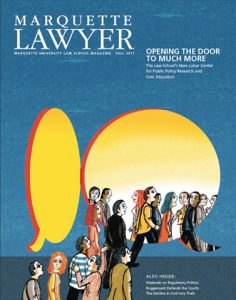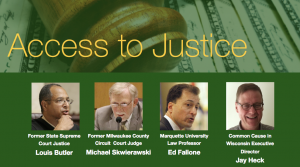New Magazine Focuses on Opening the Door for More Work Addressing Big Questions
 The illustration on the cover of the new Marquette Lawyer magazine shows people entering a large door shaped like the letter Q—or a comment bubble.
The illustration on the cover of the new Marquette Lawyer magazine shows people entering a large door shaped like the letter Q—or a comment bubble.
Consider the door a symbol for big questions—or the information that we might get from others to help answer them. It has been a goal of the public policy initiative of Marquette Law School for more than a decade to engage people in considering many of the major issues that face Milwaukee, Wisconsin, and the world beyond. The Law School does not purport itself to provide the answers, but offers a platform for furthering awareness and knowledge about the questions and ways different people answer them.
A recent $5.5 million gift from Milwaukee philanthropists Sheldon and Marianne Lubar is “opening the door to much more” for the initiative, as the magazine cover says. Now named the Lubar Center for Public Policy Research and Civic Education, the initiative is expanding its scope and offerings. This gift, added to a gift the Lubars made in 2010, has created a $7 million endowment to support the work.
In one article, which can be read by clicking here, the magazine describes the development of the public policy initiative and looks at what lies ahead. A second article, which can be read by clicking here, profiles the Lubars, who have had great impact on the Milwaukee area as business and civic leaders.

